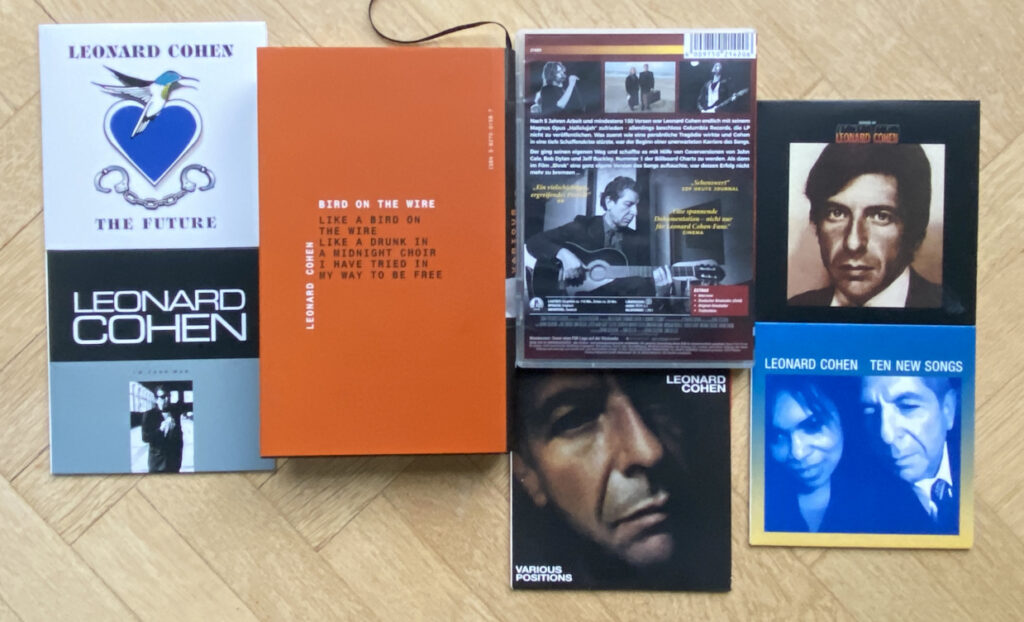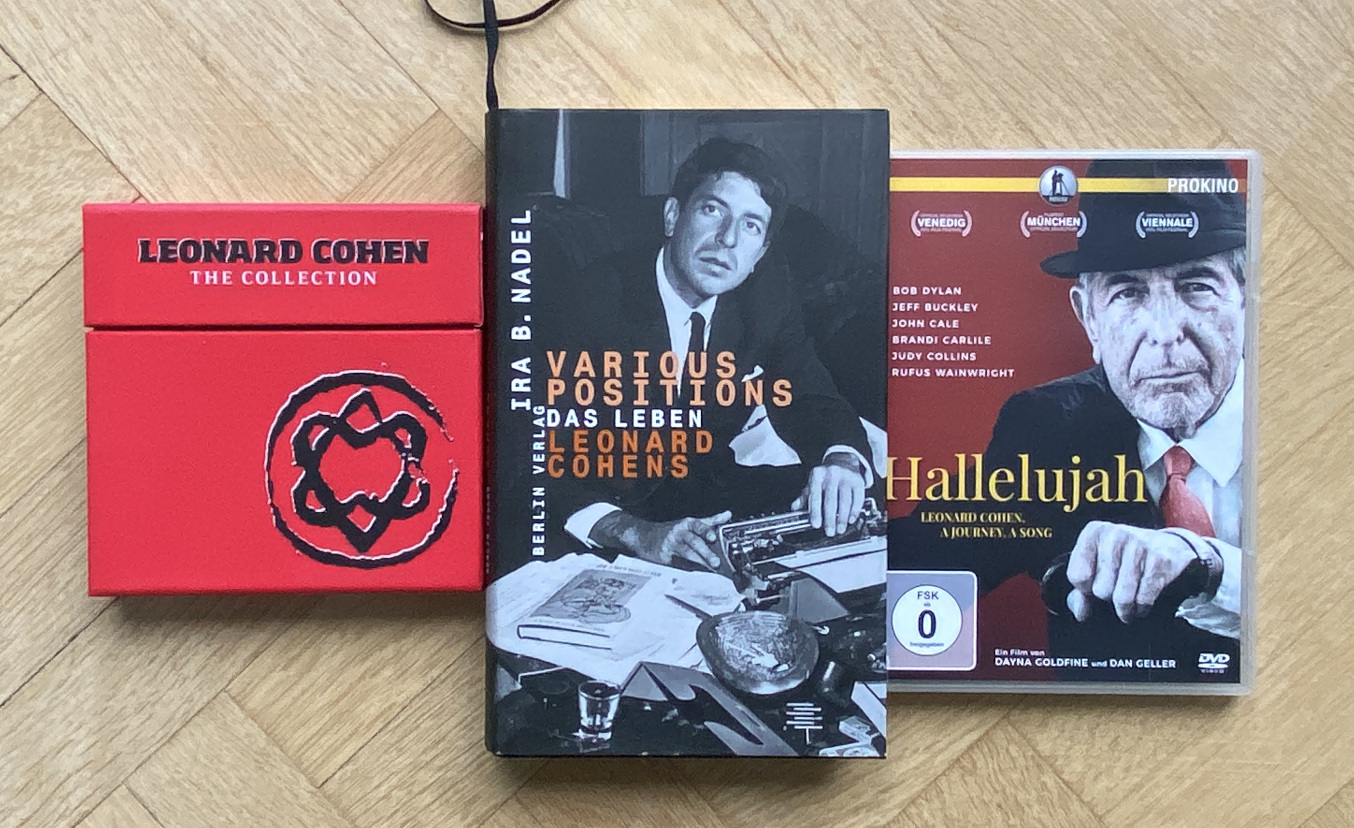Is it possible not to know Leonard Cohen? Or more precise, not to know one of his songs? His poetry became the background voice of our lives.
Many, many famous artists interpreted his song, sometimes making them far more famous than when he sung them. I got my first two CD’s of Leonard Cohen around the year 2000 and they were interpretations of his songs by Billy Joel, Elton John, Bono, Sting, Peter Gabriel, Nick Cave and others. By then Leonard Cohen had been back in the music business, after 5 years of retreat to a Buddhist / Zen monastery close to Los Angeles. A little later he discovered that his manager had stolen his money and started concert tours again.
The picture we have today of Leonard Cohen is that of a very cool man in his 70s in a suit and with a hat, singing of emotions we all know in a voice that is calming and peaceful. Far more peaceful than the texts of his songs.
In his songs he tells us that he lied recklessly to gain advantages from women, of depression, of hope, of love (of course), of love being not so strong after all, of people who had used him, of people he had used, of faith, of losing faith, of war and battles.
Leonard Cohen was born in 1934 in Quebec, Canada and started out as a writer and poet. When he was moderately successful in this genre, he travelled the world. On the Greek Island of Hydra in the early 1960s he met Marianne Ihlen, the famous “Marianne” of the song. Hydra was, back then, an artist colony with many foreign people living there.
Whilst their love story is a sad one, with Marianne being the weaker and more suffering part, her influence on Leonard Cohen was deep. He started to write song texts when living with her, on and off, and finally pursued a career as a singer from 1966 onwards. Nick Broomfields documentary gives tribute to them as a couple and as individual artists. It also shows the destructive side of Leonard Cohen with women and Marianne Ihlens difficult later life. They died only a few months apart in 2016.
In 1966 Leonard Cohen moved to New York and lived in the famous Chelsea Hotel, a creative centre for artists. His first album was published in 1967 and his career as a singer and songwriter took off. It was the time of the big alternative festivals, of Bob Dyland and Joan Baez, of free love and little thoughts of tomorrow. Individualism was king.
Leonard Cohen then met his nemesis, Suzanne Elrod (not the “Suzanne” of the song). It seems she was at least as tough as he and not bound by too many scruples when it came to love. They had two children, lived together and later separated again.
He had always had a problem in staying with one woman exclusively; after a while he seemed to become obsessed by the thought of missing something. His companions came and went – Marianne and Suzanne certainly being the ones leaving the most lasting impression.
During the mid-1980s and early 1990s his success was unquestionable. With CD’s gaining audience, his songs became known to more people. Leonard Cohen himself, though, was not a happy man and decided to stay for 5 years to a Buddhist / Zen monastery in the USA. Ira Nadel’s book ends at that time, because she finished it in 1997. Had he not come out of retreat and being forced on the stage again, her book’s view would have been most probably our view on his career. Strong songwriter, interesting man, but kind of a niche celebrity.

During his time in the monastery, his songs got a life of their own, they were covered by many artists. I own a version of his songs in Afrikaans – they touched a note in every corner of the world. Especially “Hallelujah” became like hymn, sung by Jeff Buckley and many others. It was played even in the movie “Shrek”.
Leonard Cohen’s manager used the time he was away to licence many songs to many people, and to keep the money to herself. This was only discovered in 2004/2005, after he had published new albums. Not much of his retirement funds were left when the fraud became public. Leonard Cohen started concert tours again as a result, this being the only way to fast cash. The world appreciated it.
What had cost him financially because the money did not reach him, had made his audience bigger: the licensing of his songs to other artists with a sometime much larger fan base. “First we take Manhattan, then we take Berlin” for example became so much a Joe Cocker song, that most people forgot who had written it.
Those concert tours from the mid-2000s onwards almost to his death, were certainly nothing he had planned. But more than any album this 70s-something man with the hat and the suit and the calm and peaceful voice hit a nerve. He transported strong emotions on the stage. People knew he had lived through all this. He was credible.
Through the increased interest he was able to re-write his story and to be actively involved in his legend. Did he care? Oh yes! Before his retreat he was a successful singer of the 20th century. When he came back on stage, social media was ascending and he became an icon of the 21st century. His songs were all around through many voices, but seeing the legend perform himself was a real event.
Who would not feel glad to be offered a lifetime of admiration? His new albums were critically acclaimed, the last one, “You want it darker”, was his goodbye to the world.
According to a Sydney Morning Herald article by Bernard Zuel of July 11, 2022, Leonard Cohen had predicted a long time ago that he had a long posthumous career before him. True or not, that was what happened.
Leonard Cohen was very human. Not always of the nice kind, but who is? He was a saint and a sinner, and he was very honest about it. His legacy are his songs, may they be with us forever.
All rights to the books, DVDs and CDs belong to:
Nadel, Ira B., 1997: Various Positions, Das Leben des Leonard Cohen, Eine Biographie (original: A Biography of Leonard Cohen), originally published by Random House, Canada, Toronto, published in Germany by Berlin Verlag, Berlin
DVD: Hallelujah, Leonard Cohen, A Journey, A Song – a film of Dayna Goldfine and Dan Geller, 2021, Sony Picture Classics, DOGWOOF
DVD: Marianne & Leonard, Words of Love – a film by Nick Broomfield, 2019, a Lafayette film production, DOGWOOF
CD: Leonard Cohen, The Collection, 5 Discs (Songs of Leonard Cohen, Various Positions, I’m your Man, The Future, Ten New Songs), Sony BMG Music Entertainment, originally released 1968, 1984, 1988, 1992, 2001, together released in 2008
CD: Leonard Cohen, You Want It Darker, 2016, Sony Music Entertainment, produced by Adam Cohen
CD: Leonard Cohen, Greatest Hits, 2009, Columbia /Sony Music Entertainment
CD: I’m Your Man, The Songs of Leonard Cohen, 1991, Menhir/Columbia is the exclusive trademark by Sony Music Entertainment. Various Interpreters of Leonard Cohens Songs
CD: Koos van der Merwe, Leonard Cohen in Afrikaans, 2013, produced by Fuzz by Odysee Records, Pretoria
CD: Tower of Songs, The Songs of Leonard Cohen, 1995, A&M Records

